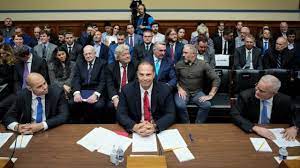Key Lessons from Whistleblower David Grusch’s Testimony in Congress Regarding the UFO Hearings
UFOs have long been a source of fascination for the public’s culture, science fiction, and conspiracy theories, and they have now reached the world of lawmakers. In front of a House Oversight Subcommittee on UFOs on Thursday, whistleblower and former intelligence officer David Grusch delivered his much awaited testimony. Additional evidence from retired Navy aviators David Fravor and Ryan Graves, who spoke of experiences with UAPS more than a decade and a continent apart, backed up his claims. Outlook examines some of the most important lessons learned from the hearing, which made headlines all across the globe.
The background to the eagerly awaited hearing, which took place in a room of the famed Rayburn House Office Building, which has hosted numerous historic hearings over the years, delves into recent attempts to put pressure on the Pentagon and other intelligence agencies to disclose long-concealed and shadowy programs into the investigation of UAPs. In 2017 and 2018, the two former Navy pilots revealed their sightings to the New York Times for the first time, which sparked demands for the government to be more open about UFOs. It put pressure on the Pentagon’s Advanced Aerospace Threat Identification Program to compile information from several investigations and sightings and provide an explanation. The majority of the government’s activity, however, was still kept secret. prior to David Grusch.
Under oath, Grusch, a former Air Force intelligence official who worked with the Pentagon Task Force looking into UAPs (the official government term for UFOs), testified that there were in fact long-running programs to conceal their scope and extent and shelter “non-human biologic materials” recovered from crash sites. Representative Tim Burchett of the Republic of Tennessee and Democrat Alexandria Ocasio-Cortez of New York both cross-examined Grusch. Burchett discussed a “cover-up” that went well beyond party politics, but Grusch was the center of attention.
Rep. Robert Garcia questioned Grusch about whether he thought the government had UAPs, and Grusch said that he did. He stated that this was based on 40 witness interviews conducted over the course of four years, and that he knew “exact locations” of where this equipment was located. He said that some of these sites had also been given to the intelligence committees and the inspector general.
Grusch said that he was not allowed access to documents and information pertaining to a multidecade UAP crash recovery and reverse engineering work. Sue Gough, a Pentagon spokeswoman, stated that the Pentagon had no “verifiable information to substantiate claims that any programs regarding the possession or reverse-engineering of extraterrestrial materials have existed in the past or exist currently.” This allegation was categorically denied by the government.
The Pentagon and other intelligence services have resisted Grusch’s confession and vehemently denied it. Rep. Tim Burchett asked Grusch if he had “personal knowledge of people” who had been hurt or killed in an attempt to hide something. Grusch responded “yes” and went on to elaborate on what he called “administrative terrorism,” noting that he had received overwhelmingly positive support from colleagues but also talked about how it had a serious negative impact on their careers.
Administrative terrorism is what I call it. They use it as a weapon in their arsenal to intimidate others, particularly professional government employees who want to further their careers and ascent up the corporate ladder care about their clearance, reputation, and job. Many people withdraw when you threaten that flow or that professional route, but I’m here to speak for them.
Additionally, Grusch said in court that he was aware of ongoing plots for retaliation against him. He was then asked whether someone had been killed in an attempt to cover it up. He declined to answer this question, stating that he could not discuss it in a public session. Grusch would often seek to deflect from other lines of inquiry, stating in response to several inquiries that he could not discuss it in public hearings. They pointed out that the government’s practice of withholding information about such programs was nothing new and that Grusch had shied away from discussing many of the allegations he had made in his sensational NewsNation interview from more than a month prior, including the claim that the government possessed a UAP the size of a “football field.”
However, Grusch said he was hesitant to use the phrase “alien life” in his own NewsNation interview, while confirming the scope and covert nature of the government task groups looking into the issue.
Strong additional evidence from Navy pilots Fravor and Graves, who had sparked a resurgence of interest in governmental responsibility on UAP projects, supported Grusch’s testimony. While on a routine training operation with the aircraft carrier USS Nimitz off the coast of southern California in November 2004, Fravor was the pilot who captured the iconic “Tic Tac” footage. Despite the fact that no government representatives appeared on Wednesday, observers noticed that the Tic Tac film was the most difficult for the administration to dismiss.
Rep. Ocasio-Cortez posed a germane question to the Navy pilots, asking them where they would seek for solutions if they were in her shoes. They hesitated similarly to Grusch, but Fravor said, “If you know where to look and who to talk to… then you have them.” Given his high clearance and comprehensive understanding of the programs, he said, Grusch would be the best person to speak with in order to get the answers in this case. Once again hesitating, Grusch assured Rep. Ocasio-Cortez that he would be pleased to respond in a private setting.
The testimony of all three seemed to clearly depict extensive government and defense efforts, as well as the use of public money to conceal and keep such projects completely under lock and key. As a result, legislators are now seeking clarification on the best way to go ahead with their inquiries.
The chairman of the House Committee on National Security, the Border, and Foreign Affairs, Rep. Glenn Grothman, stated in his last comments, “Obviously, I believe many of us are going to look forward to obtaining some answers in a more private context. I anticipate that this will result in law. praised the proceedings for being “illuminating” Despite the fact that Grusch’s first discoveries caused a tempest that eventually led to a hearing, the members’ reaction now raises the prospect of legislation, openness, and accountability regarding one of the US government’s historically most clandestine programs.
Finally, it seems that the topic of UAPs has successfully crossed into the legislative chambers of the Rayburn Building from the sphere of popular imagination.







